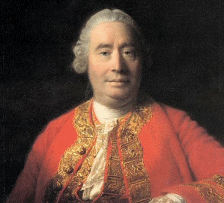
and skepticism
. He was one of the most important figures in the history of Western philosophy
and the Scottish Enlightenment
. Hume is often grouped with John Locke
, George Berkeley
, and a handful of others as a British Empiricist.
Beginning with his A Treatise of Human Nature
(1739), Hume strove to create a total naturalistic
"science of man
" that examined the psychological basis of human nature
.
Does a man of sense run after every silly tale of hobgoblins or fairies, and canvass particularly the evidence? I never knew anyone, that examined and deliberated about nonsense who did not believe it before the end of his enquiries. ![]()
With regard to politics and the character of princes and great men, I think I am very moderate. My views of things are more conformable to Whig principles; my representation of persons to Tory prejudices. Nothing can so much prove that men commonly regard more persons than things, as to find that I am commonly numbered among the Tories.![]()
Here am I who have written on all sorts of subjects calculated to excite hostility, moral, political, and religious, and yet I have no enemies — except, indeed, all the Whigs, all the Tories, and all the Christians.![]()
Methinks I am like a man, who having struck on many shoals, and having narrowly escap'd shipwreck in passing a small frith, has yet the temerity to put out to sea in the same leaky weather-beaten vessel, and even carries his ambition so far as to think of compassing the globe under these disadvantageous circumstances.![]()
Generally speaking, the errors in religion are dangerous; those in philosophy only ridiculous.![]()

